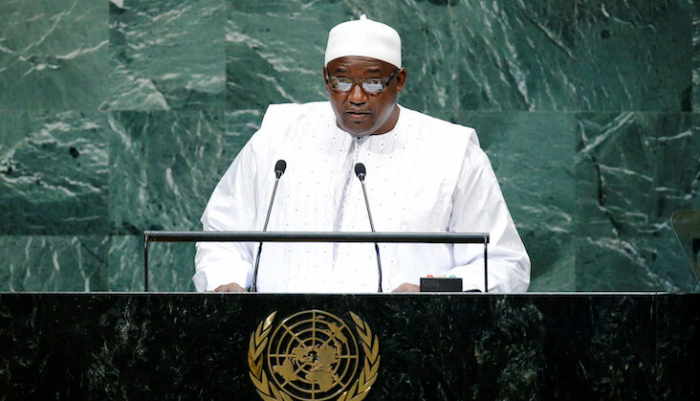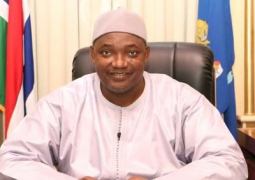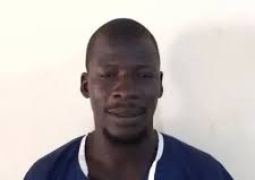
The Gambian president highlighted the issue in his remarkable speech delivered at the just concluded General Debate of the 79th Session of the United Nations General Assembly (UNGA) in the US.
Barrow’s speech also touched on issues ranging from women and empowerment to promoting human rights and establishing vibrant democratic environment, peace and security, democratic freedoms, climate change, migration, and international conflicts.
Here, following, is the full statement of the Gambian leader at the 79th Session of UNGA:
Statement by H.E. Mr. Adama Barrow, President of the Republic of The Gambia at the General Debate of the 79th Session of the United Nations General Assembly - September 2024
President of the 79th Session of the UN General Assembly,
Secretary General, Mr. Antonio Guterres,
Your Majesties and Excellencies, Heads of State and Government,
Heads of Delegation,
Distinguished Delegates,
Ladies and Gentlemen,
It is an honour for The Gambia to participate in the 79th Session of the United Nations General Assembly and to engage in meaningful dialogue with global leaders and partners on the vision of shaping a more prosperous future for humankind.
Your Excellency, Mr. President,
Allow me to express my heartfelt congratulations to you on your assuming the role of President for the 79th Session.
I similarly wish to register sincere gratitude to His Excellency, Ambassador Dennis Francis for his exemplary leadership and accomplishments during the 78th Session.
Mr. President,
As we undertake to chart the future we envision, we welcome the initiative presented by Secretary-General Guterres at the Summit of the Future under the theme: “Multilateral Solutions for a Better Tomorrow.”
My delegation firmly believes that the path to a better tomorrow lies in multilateralism and closer international cooperation. Through our collective responsibility and inclusive participation, we can decisively confront and overcome our challenges and bottlenecks.
The high-level ‘Summit of the Future’ has determined that human actions are largely responsible for the challenges we face today; therefore, it is within our power to ably address the disasters that continuously trouble our nations.
To succeed, however, the international community must recommit to implementing the resolutions of the Summit of the Future to tackle such critical global challenges as climate change, poverty, transnational crimes, and conflict.
These incidents underscore the urgent need for comprehensive reforms within the United Nations system, particularly the UN Security Council and the International Financial Institutions.
We must equally strive for a more representative, just, and inclusive United Nations to shape the world we so dearly want.
Mr. President,
The Gambia’s perspective on the theme: “Leaving no one behind: Acting together for the advancement of peace, sustainable development, and human dignity for present and future generations,” aligns closely with the principles and aspirations of Agenda 2030 for sustainable development.
In accordance with the principles of the United Nations Charter, the theme serves as a crucial reminder to the international community of the need for solidarity and renewed commitment.
With specific reference to The Gambia, the framework of the Sustainable Development Goals (SDGs) is central to our national agenda, and we are committed to ensuring that our development efforts are both sustainable and impactful.
Like many Least Developed Countries (LDCs), The Gambia faces huge challenges that pose serious threats to our survival as a nation, hence requiring collective international efforts to resolve.
Consequently, the global community needs to assist the Least Developed Countries, especially to address the burden of inequality, build more robust economies, and create policy space for economic growth. To tackle the debt burden and internal state weaknesses, we need to increase investment in capacity building.
Also, we must jointly endeavour to bridge the digital divide and support technology transfer to advance development.
Mr. President,
We live in a world with widening inequalities, thus suppressing the weak and making the conditions of the poor worse grossly violates the expressed ideals and spirit of the Summit of the Future.
The Gambia is fully committed to the global call for gender equality and recognises the indispensable role women play in socio-economic development. We firmly believe that empowering women translates into community empowerment and, ultimately, inclusive development.
For these reasons, my government places great emphasis on women’s rights, and we are dedicated to protecting and empowering women. As President, I will continue to ensure that women and girls are protected and given the necessary space to contribute meaningfully to our national development agenda.
On youth matters, at a recent consultative summit, stakeholders recommended a sharper focus on Innovation and Climate Change, Gender Equity, Bridging the Digital Divide, and Global Governance that promotes youth empowerment through employment, education, and health.
The Summit recommendations will inform endeavours to fill policy gaps and expand funding opportunities for better youth engagement.
Furthermore, my government commits to aligning our national priorities with global benchmarks and, in partnership with youth-led organisations and other stakeholders, we also resolve to use transformative solutions to create greater opportunities for all.
Mr. President,
The Gambia believes in collective international efforts to combat global challenges. Based on this, last year, The Gambia joined the international community by co-sponsoring UN General Assembly consensus resolution 77/276, which sought to engage the International Court of Justice (ICJ) on the obligations of States regarding climate change.
Last August, The Gambia submitted its written statement to the ICJ, and we look forward to participating in the oral hearings later this year in The Hague.
At the national level, The Gambia remains steadfast in its commitment to promoting human rights and establishing a vibrant democratic environment.
The establishment of a National Human Rights Commission and entrenchment of a free, independent, and impartial judiciary provide a solid framework and a sense of security for our citizens, thus ensuring they have a place to seek redress for injustice.
I am happy to report that, since 2017, The Gambia has neither recorded a single political prisoner, nor has any journalist or human rights activist been jailed.
Proudly too, in August 2024, The Gambia was recognised as one of Africa’s leading defenders of freedom of expression and ranked third in Article 19’s Global Expression Report 2024. We will continue striving to better our situation.
Mr. President,
As committed advocates of peace and security, respect for basic rights and freedoms, and the application of international law, we stand firmly against injustice, no matter where it occurs. No doubt, as a nation of peace, guided by democratic principles, we have learned valuable lessons to act upon and share.
With the help of the international community, we are steadily taking steps to bring closure to the saga of the victims of dictatorship in our country. So far, we have successfully managed the Transitional Justice and Reform processes.
Moving forward, we count on your support in the next critical stages of ensuring justice, reconciliation, and reparation, where necessary.
The Gambia will continue advocating preventive approaches to peacebuilding to avert future conflicts.
Once again, I take this opportunity to express our appreciation of all the support the UN Peace-building Commission has been extending to us.
Mr. President,
The ongoing conflicts in Palestine, Sudan, the Sahel, Ukraine and Russia, the Democratic Republic of the Congo, Libya, and other conflict zones demand the international community’s immediate intervention.
We must explore all diplomatic means to restore lasting peace worldwide and free all innocent people, particularly women and children, from the calamities of war.
We call on the international community to prioritise support for the post-conflict reconstruction of Gaza and the improvement of economic conditions in the West Bank. Even though the situation in that region is extremely serious, the intense destruction of lives and property continues.
The Israeli occupation, expansion of settlements, blockade of Gaza, and restrictions in the West Bank, together with the threat of intensifying the war to a regional conflict, continue to worsen the ongoing tensions in the Middle East.
Accordingly, I call on the United Nations, the international community, and the Organization of Islamic Cooperation (OIC) Member States to join forces and urgently bring about permanent peace in Palestine.
Through recognised structures, I am, as Chair of the OIC, committed to stepping up efforts and exploring every possible diplomatic and peaceful channel to resolve the Middle East crisis.
The OIC has been very active and, under my leadership, will continue to promote and pursue peace in that region. Our common objective is to create a situation wherein Israel and Palestine coexist in peace and security under a two-state arrangement and within the recognised pre-1967 borders.
With the sustained support of the OIC, The Gambia has stood as a beacon of hope for the oppressed Rohingya Muslims of Myanmar. Despite relentless efforts over the past five (5) years, the oppressive regime in Myanmar has intensified its oppressive campaign through forced exile and unspeakable acts of violence.
During my current three-year tenure as OIC Chairman, my office will be available also for dialogue to bring lasting, peaceful relations between Iran, its immediate neighbours, and our Western partners.
Globally, we have the collective responsibility of acting speedily to peacefully address the situation in Palestine, Sudan, Ukraine, and the Sahel region.
Mr. President,
We commend the efforts of the Kingdom of Morocco and the viability of the Moroccan Autonomy Initiative. The Initiative aligns with the principles of the UN Charter, and it provides a platform for all parties involved in the Moroccan Sahara conflict to engage in a UN-led dialogue for a permanent, mutually agreed political solution.
With regard to recognition and respect for the One China Principle, we continue to stand with China. The People's Republic of China represents renewed hope for global rebalancing towards justice, peace, and development. China’s generous support to its southern neighbours, through its numerous development cooperation initiatives, has proven usefully impactful and strategic.
Mr. President,
Migration has ever been a fundamental aspect of human development and it significantly contributes to the growth of both home and host countries.
The international community should address migration in a regulated manner and decriminalise it. Indeed, human beings should not risk losing their lives in pursuit of a better future.
In this regard, The Gambia Government is collaborating with relevant countries to improve the plight of migrants. Although we must discourage irregular migration, we are duty-bound to respect the rights of migrants and ensure they are treated with dignity.
Mr. President,
We recognise that dictatorship, conflict, climate change, poverty, and lack of opportunities are part of the root causes of migration. Economic sanctions imposed on States also contribute to forced migration. The long-standing U.S. embargo against Cuba is an example.
My view is that this embargo should give way to renewed good neighbourliness and cooperative relations between the two nations.
The international community should address inequality with compassion and fulfil the commitment to the official development assistance pledge made by donor countries. As regards the original countries of migrants, we must uphold the ideals and principles of democracy, good governance, and wise resource management approaches.
Mr. President,
In conclusion, the international community must prioritise diplomacy, dialogue, and mutual understanding, as we confront challenges of global concern. I also urge the private sector to collaborate with our governments in taking concrete action towards our common goals.
Simple yet impactful steps, such as supporting local initiatives, promoting inclusive policies, and engaging in global partnerships, can make a significant difference in the world order.
Despite the challenges we face, there is immense potential for positive change through collective endeavours.
Let us embrace a message of hope, resilience, and optimism for the future. Together, we can create a world where peace, sustainable development, and human dignity are not mere dreams but a reality for all.
Thank you.




